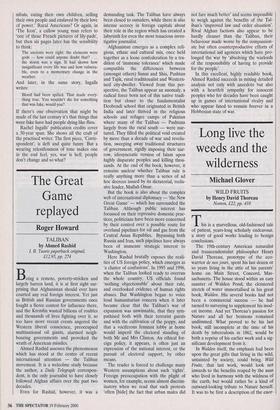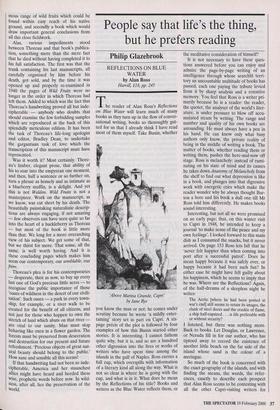Long live the weeds and the wilderness
Michael Glover
WILD FRUITS by Henry David Thoreau Norton, £22, pp. 410 This is a marvellous, old-fashioned tale of patient, years-long scholarly endeavour, a story of good works leading to benign conclusions.
The 19th-century American naturalist and transcendentalist philosopher Henry David Thoreau, prototype of the eco- warrior de nos fours, spent his last dozen or so years living in the attic of his parents' home on Main Street, Concord, Mas- sachusetts. The house stood within an easy saunter of Walden Pond, the cloistered stretch of water immortalised in his great book, Walden. His several books had not been a commercial success — he had turned to surveying to supplement his mod- est income. And yet Thoreau's passion for Nature and all her benisons remained undimmed. What proved to be his last book, still incomplete at the time of his death by tuberculosis in 1862, would be both a reprise of his earlier work and a sig- nificant development from it.
In Walden itself, the emphasis had been upon the great gifts that living in the wild, untainted by society, could bring. Wild Fruits, that last work, would look not inwards to the benefits reaped by the man who lived in harmony with the wildness of the earth, but would rather be a kind of outward-looking tribute to Nature herself. It was to be first a description of the enor- mous range of wild fruits which could be found within easy reach of his native ground, and secondly a book which would draw important general conclusions from all this close fieldwork.
Alas, various impediments stood between Thoreau and that book's publica- tion, something more than the mere fact that he died without having completed it to his full satisfaction. The first was that the trunk containing his last manuscripts, all carefully organised by him before his death, got sold, and by the time it was opened up and properly re-examined in 1940 the pages of Wild Fruits were no longer in the order in which Thoreau had left them. Added to which was the fact that Thoreau's handwriting proved all but inde- cipherable — anybody who doubts that should examine the few forbidding samples which are reproduced at the back of this splendidly meticulous edition. It has been the task of Thoreau's life-long apologist and editor, Bradley Dean, to undertake the gargantuan task of love which the transcription of this manuscript must have represented.
Was it worth it? Most certainly. Thore- au's limber, elegant prose, that ability of his to soar into the empyrean one moment, and then, half a sentence or so further on, turn a phrase as homely and as intimate as a blueberry muffin, is a delight. And yet this is not Walden. Wild Fruits is not a masterpiece. Work on the manuscript, as we know, was cut short by his death. The beautifully painstaking naturalistic descrip- tions are always engaging, if not amazing — few observers can have seen quite so far into the heart of a huckleberry as Thoreau — but most of the book is little more than that. We long for a more overarching view of his subject. We get some of that, but we thirst for more. That some, all the same, is well worth having. And it is these concluding pages which makes him seem our contemporary, our semblable, our frere.
Thoreau's plea is for his contemporaries — desperate, then as now, to buy up every last one of God's precious little acres — to recognise the public importance of those `oases of wildness in the desert of our civili- sation'. Such oases — a park in every town- ship, for example, or a river walk to be created for the benefit of all citizens, and not just for those who happen to own the stretch of land which abuts on that river are vital to our sanity. Man must stop behaving like oxen in a flower garden. The forests must be preserved from desecration and destruction for our present and future refreshment. 'Precious objects of great nat- ural beauty should belong to the public.' How sane and sensible all this seems!
If that handwriting had not been so inde- cipherable, America and her staunchest allies might have heard and heeded these Wise, prophetic words before now. In wild- ness, after all, lies the preservation of the World.



































































 Previous page
Previous page